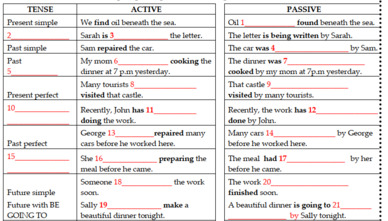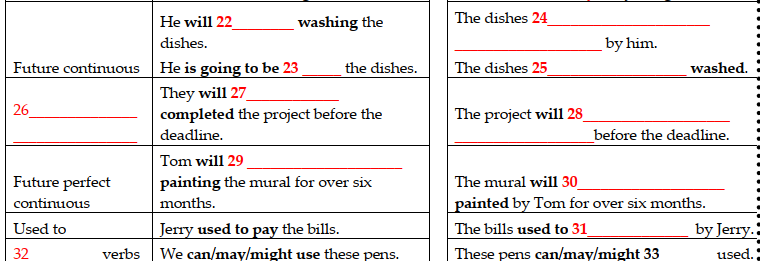
Hãy nhập câu hỏi của bạn vào đây, nếu là tài khoản VIP, bạn sẽ được ưu tiên trả lời.


Both The Passive and Present Perfect use past participle, but what really is different between them?

Bạn tham khảo nha!
Sử dụng thì hiện tại hoàn thành:
Thì hiện tại hoàn thành là thì thường diễn tả điều gì đó về quá khứ có liên quan đến hiện tại. Nó có thể diễn tả một trải nghiệm trong quá khứ có ý nghĩa quan trọng đến hiện tại, hoặc nó có thể đề cập đến một hành động đã bắt đầu trong quá khứ và tiếp tục ở hiện tại, hoặc nó có thể diễn tả một hành động gần đây tạo ra hậu quả trong thời điểm hiện tại.
Cấu trúc Chúng ta tạo thì hiện tại hoàn thành bằng cách sử dụng động từ 'have' và quá khứ phân từ của động từ:
“You have finished.”
Để đặt câu hỏi, chúng ta đảo từ 'have' và chủ ngữ:
“Have you finished?”
Và để tạo ra các hình thức phủ định, chúng ta thêm 'not':
“You haven’t finished.”
Biến thể nhỏ duy nhất của điều này là với ngôi thứ ba số ít yêu cầu có thay vì có.
"She has finished."
Với thì hiện tại hoàn thành, chúng ta thường sử dụng các cách diễn đạt thời gian chưa hoàn thành như:
today, this week, this year, in my life.
Chúng ta cũng thường sử dụng các trạng từ:
yet, already, just, ever và never trong các câu hiện tại hoàn thành.
Và khi chúng ta nói về những hành động hoặc tình huống chưa hoàn thành, chúng ta sử dụng for và since.
Hãy cùng xem chi tiết ba tình huống chính mà chúng ta sử dụng thì Hiện tại hoàn thành và xem một số ví dụ.
1) Hành động gần đây
Chúng ta sử dụng thì hiện tại hoàn thành để diễn tả một hành động gần đây hoặc để hỏi xem có điều gì đó đã xảy ra gần đây không. Nó thường được dùng với những từ như just, already, yet, still.
Jack’s asked me to marry him! I’m so happy!
Jack đã yêu cầu tôi kết hôn với anh ấy! Tôi rất vui!
(Hành động đã kết thúc trong quá khứ gần đây – hệ quả hiện tại.)
Have you finished reading the newspaper yet? Ann’s just called. She’s missed her bus and will be here late.
Bạn đọc báo xong chưa? Ann vừa gọi. Cô ấy đã lỡ xe buýt và sẽ đến đây muộn.
2) Kinh nghiệm sống
Chúng ta cũng có thể dùng thì hiện tại hoàn thành để nói về những việc quan trọng mà chúng ta đã làm. Trong trường hợp này chúng ta thường dùng ever và never.
I’ve been to Canada. Have you ever been there?
Tôi đã đến Canada. Đã bao giờ bạn được không?
How many times have you travelled abroad?
Bạn đã đi du lịch nước ngoài bao nhiêu lần?
He’s won a lot of competitions during his sports career.
Anh ấy đã thắng rất nhiều cuộc thi trong sự nghiệp thể thao của mình.
3) Hành động chưa hoàn thành
Cách dùng thứ ba của thì hiện tại hoàn thành là diễn tả hành động bắt đầu trong quá khứ nhưng vẫn tiếp tục ở hiện tại. Với thì này chúng ta sử dụng for và since.
He’s worked here for 18 years.
Anh ấy đã làm việc ở đây 18 năm.
We’ve lived in the city center since 2008.
Chúng tôi đã sống ở trung tâm thành phố từ năm 2008.
How long have you known Pablo?
Bạn biết Pablo bao lâu rồi?
-Sử dụng thì hiện tại hoàn thành ở dạng bị động
Trong các ví dụ trên, chúng ta đã xem xét thì hiện tại hoàn thành ở dạng chủ động, nghĩa là chủ ngữ là người hoặc vật thực hiện hành động.
Khi chúng ta sử dụng dạng bị động, chúng ta tập trung sự chú ý vào cái gì hoặc ai nhận một hành động (đối tượng). Chúng ta sử dụng thể bị động trong hầu hết các thì trong tiếng Anh và tạo ra nó bằng cách sử dụng động từ 'to be'.
Ví dụ, ở thì hiện tại đơn:
ACTIVE: People collect the goods..
PASSIVE: The goods are collected.
Trong quá khứ đơn giản, câu trở thành:
ACTIVE: People collected the goods yesterday.
PASSIVE: The goods were collected yesterday.
Chúng ta sử dụng thì hiện tại hoàn thành ở dạng bị động vì tất cả những lý do giống như chúng ta sử dụng nó ở dạng chủ động – để nói về những hành động, trải nghiệm gần đây và những hành động/tình huống đang diễn ra. Ở dạng hiện tại hoàn thành với bị động, chúng ta luôn sử dụng
'has/have been' + dạng quá khứ phân từ.
Dưới đây là một số ví dụ:
The staff have been trained.
Các nhân viên đã được đào tạo.
The reports have been written.
Các báo cáo đã được viết.
Have the candidates been interviewed?
Các ứng viên đã được phỏng vấn chưa?
The applications haven’t been checked yet.
Các ứng dụng chưa được kiểm tra.
Have you been introduced to the new manager?
Bạn đã được giới thiệu với người quản lý mới chưa?
He’s been taken to see the President.
Anh ấy đã được đưa đến gặp Tổng thống.
Sara has been promoted three times in her career.
Sara đã được thăng chức ba lần trong sự nghiệp của mình.
The waste products have been left here since last February.
Những phế phẩm đã bị bỏ lại đây từ tháng 2 vừa qua.
Biết cách sử dụng thì hiện tại hoàn thành ở cả dạng chủ động và bị động sẽ thực sự hữu ích cho bạn khi đi làm và đi du lịch.
---Chúc bạn học tốt!---
---Study well!----

1. Some body will clean the room later.
-> The room will be cleaned later.
2. You mustn't open this parcel until Christmas Day.
-> This parcel musn't be opened until Christmas Day.
3. They can't make tea with cold water.
-> Tea can't be made with cold water.
4. The students will hold a meeting before the Teacher's Day.
-> A meeting will be held before the Teacher's Day
5. People can recycle tires to make pipes or floor coverings.
-> Tire can be recycled to make pipes or floor coverings.
6. They should send applications before December.
-> Applications should be sent before December.
7. The manage must sign the contract today.
-> The contract must be signed by the manage today.
8. They will build the new bridge by the end of the year.
-> The new bridge will be built by the end of the year.
9. We should use cloth bags instead of plastic bags.
-> Cloth bags should be used instead of plastic bags.
10. We can use the garbage to make fertilizer.
-> The garbage can be used to make fertilizer.
The house is cleaned every day.
How does a language be learned by people?

1. Minh does morning exercises regularly. He wants to be healthy ( so as to )
⇒
⇒ Minh does morning exercises regularly so as to be healthy.
2. I’m learning English. I want to read book in English. (in order to)
⇒
⇒ I’m learning English in order to read book in English.
3. She said nothing . She didn’t want to make him angry (so as to)
⇒
⇒ She said nothing so as not to make him angry.
4.The man was taken to the local hospital. He was injured in the accident. (past pariple)
⇒
⇒ The man injured in the accident was taken to the local hospital.
5. The musician is internationally famous. He appeared in the concert last night. (present pariple)
⇒
⇒ The musician appearing in the concert last night is internationally famous.
1.Minh does morning exercise regularly so as to be healthy.
2.i'm learning English in order to read book in English .
3.she said not thing so as not to make him angry .
4.the man injured in the accident as taken to the local hospital.
5.the musician appeared in the concert last night is internationally famous

Exercise 3: Supply the past simple form of the verbs in the brackets: 1) James………left………… (follow) the dog. |
2) The dog……barked…………… (bark) at him and………started………(start) to run. |
3) I (travel) ………travelled………………..…around by car with two friends and we (visit) ……visited……………lots of interesting places. |
4) James………jumped………… (jump) out of the car and…………shouted……… (shout) at the dog. |
5) I……played……………(play) football with my team yesterday. |
6)She………arrived………… (arrive) in 1978.
7)Peter……changed…………… (change) his name many years ago.
8)Julie………moved………… (move) from Canada last month.
9) I………saved………… (save) some money last year.
10)We always……cooked…………… (cook) together.
11)The cat………jumped………… (jump) on the tree, and the bird………flied………… (fly) away.
12)You………played………… (play) very well.

Verb Past Past participle
Do did done
Go went gone
Drive drove driven
Hit hit hit
Break broke broken
Eat ate eaten
Be was/were been
Find found found
Fight fought fought
Watch watched watched
Close closed closed
| Verb | Past | Past Participant |
| Do | Did | Done |
| Go | Went | Gone |
| Drive | Drove | Driven |
| Hit | Hit | Hit |
| Break | Broke | Broken |
| It | ||
| Be | Was/Were | Been |
| Find | Found | Found |
| Fight | Fought | Fought |
| Watch | Watched | Watched |
| Close | Closed | Closed |


Run
run